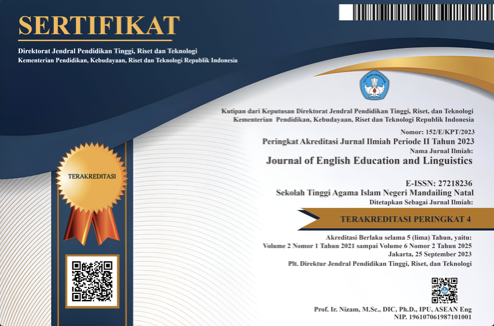LEARNING STYLES IN RELATION TO ACADEMIC PERFORMANCE OF BTVTED STUDENTS
DOI:
https://doi.org/10.56874/jeel.v2i2.571Abstract
The study is a descriptive-correlational research which aims to determine the significant relationships between students’ learning styles and their academic performance. The study focuses on the learning styles of the first year BTVTRD students who are officially enrolled during the first semester of the school year 2019 – 2020. A survey is utilized in the collection of data while in its statistical analysis the Person Correlation Coefficient was employed. The results revealed that, on learning styles, diverse characteristics define the nature of learners in the BTVTED program. Their learning styles encompass physical, cognitive, affective, and physiological elements that influence learning. On academic performance, majority of the BTVTED students are classified above average. Applying the parametric test using Pearson Product – Moment Correlation, the study concludes that there is a significant relationship between students’ learning styles and their academic performance on the physical, cognitive, and physiological elements of learning. However, on its affective aspect, the contrary hypothesis is proved. Overall, the study finds the need for specific actions that will address the issue on pedagogical strategies employed in teaching the curriculum, approaches in the delivery of instructional content, monitoring, evaluation, and adjustments of key issues in the teaching and learning, institutional program to help students in difficult circumstances, and other studies that will help the college improve its quality education and services.
References
Ofelia Morabe-Carague, National Progress Depends on Capacity at Our Human resources, PUP Open University Journal of Open and Distance Learning, Volume 3, No.1, January to December 2002
Alamagir, A.K.M. “Stakeholder for Distance Education: Focus on Learners” Paper presented at the ICDE Asian Regional Conference held at New Delhi, India on November 3-5, 2000. http://www.cemcaorg/ignou-icde/paper30.him.
Bustos, M.A., The Relationship of learning Styles, teaching Styles, and reading Achievement of Elementary School Children, Unpublished Doctoral Dissertation, University of the Philippines, Quezon City, 1994.
Carl Roger‟s Theory, http://tip,psychology,org/rogers,HTML
Dunn, R. and Griggs, S.A. Multiculturalism and Learning Style, Teaching and Counseling Adolescents, Connecticut: Praeger Publisher, greenwood Publishing Group, 1995.
İlçin, N., Tomruk, M., Yeşilyaprak, S.S. et al. The relationship between learning styles and academic performance in TURKISH physiotherapy students. BMC Med Educ 18, 291 (2018). https://doi.org/10.1186/s12909-018-1400-2
Joseph Perkins, Digital Leadership in Education, Culture and Teacher Effectiveness. Joe Perkins – Digital Leadership in Education (ucl.ac.uk)
Joy Reid, Learning Styles Preferences, http://www,lookingahead,henile.com/filing/1- styles,htm
Mary Alice Gunter, Thomas H. Estes, and Jan Schwab, Instruction: A Models Approach, Third Edition, Allyn and Bacon, MA, USA, 1999.
Multiple Intelligences, Gardner's 9 Multiple Intelligences and how we learn things (drawingontheword.com)
Republic Act No. 10533, An Act Enhancing the Philippine Basic Education System by Strengthening Its Curriculum and Increasing the Number of Years for Basic Education, Appropriating Funds Therefor and for other Purposes
Reyes-Batino M.T. Learning Style Intervention; Effects on Math Achievement, Attitudes, and Anxiety Reduction, Unpublished Doctoral Dissertation, University of the Philippines, Quezon City, 1999.
Richard Felder, Learning Styles, http://www.ncu/fedler-public/learning_Styles,HTML
Downloads
Published
Issue
Section
License
All articles published in the Journal of English Education and Linguistics are licensed under a Creative Commons Attribution-ShareAlike 4.0 International (CC BY-SA) license. This means anyone is free to copy, transform, or redistribute articles for any lawful purpose in any medium, provided they give appropriate attribution to the original author(s) and Journal of English Education and Linguistics, link to the license, indicate if changes were made, and redistribute any derivative work under the same license.
Copyright on articles is retained by the respective author(s) without restrictions. A non-exclusive license is granted to the Journal of English Education and Linguistics to publish the article and identify itself as its original publisher, along with the commercial right to include the article in a hardcopy issue for sale to libraries and individuals.
Although the conditions of the Creative Commons Attribution-ShareAlike 4.0 International (CC BY-SA) license do not apply to authors (as the copyright holder of your article, you have no restrictions on your rights), by submitting to the Journal of English Education and Linguistics, authors recognize the rights of readers and must grant any third party the right to use their articles to the extent provided by the license.

This work is licensed under a Creative Commons Attribution-ShareAlike 4.0 International License.








